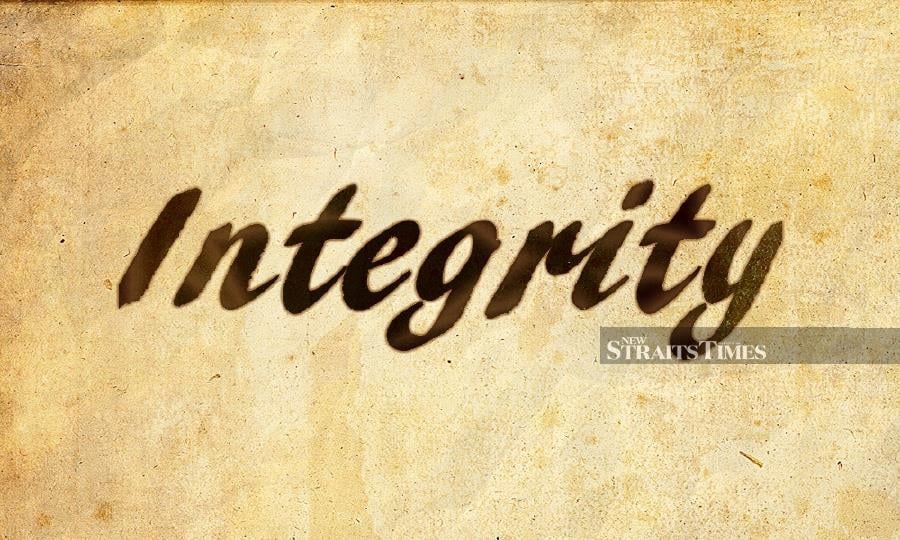I am absolutely sure that you have either used the word “integrity” yourself to describe how you expect someone to behave towards you, or you have had that word used on you, when someone is asking something of you.
It is a word that we hear so often. It can describe a myriad of emotions, but most of all, it is used to draw attention to ethical behaviour, honesty and trustworthiness; or the lack of it.
Integrity is about doing the right thing, regardless of circumstances, convenience, or alliances.
In my experience, people who act without integrity tend to say that the world is so competitive, and therefore, to get ahead, or to even stay afloat, they had no choice but to behave without paying much heed to the ethics of their actions.
Yes, the world is a robust place, and of course, strategic thinking plays a crucial role in ensuring you have upward mobility, and that you achieve success in whatever you want.
But, should you not hold yourself to certain standards of integrity, at all times?
If you are a leader of people, an entrepreneur, or a business owner, I strongly recommend that you accept the reality that you’ll be held to a much higher standard of integrity, than others.
You hear the word “integrity” used in so many contexts, but have you taken time to reflect on what happens if you behave without it?
The lack of integrity leads to distrust.
I have noticed that distrust does not exhibit itself freely. When you question someone’s trustworthiness, they will not retort back by accepting that you should not trust them.
The dishonesty in people is mostly hidden.
I was recently in a meeting with an organisation to determine its future growth plans. The various managers in the firm offered evidence of how growth can be driven. I noticed the leaders expecting and accepting their analysis.
But when I delved deeper with individuals in the company, I found out that beneath the surface, many of the same managers withheld full disclosure about what was actually happening.
And as I sought to work out why they were not being frank about things, it became apparent that there was a palpable distrust between most of them.
Many business owners, and leaders think that their duty is to be optimistic all the time. They feel that being buoyant will keep their teams motivated.
But next time you have a strategy meeting, look carefully at what are the real sentiments of your team.
Are there subterranean undercurrents of suspicion that exist? Are your line leaders creating smoke and mirrors to cover up the truth? Do people only want vague discussions or are they offering objective views that are supported by workplace evidence?
As a leader, you must trust your people, and the same time believe in your ability to lead. This way, you can give an accurate picture of where your company is, and offer a pathway to growth.
And, all this can only happen when you are honourable yourself; create an environment at your workplace that fosters the growth of integrity in others; and hold yourself, and everyone with you, accountable for acting with honesty.
The next thing I notice in companies and organisations where there is a lack of integrity is the prevalence of apathy or indifference.
In dealing with another situation over the past few weeks for a client, I realised that in my conversations with the executives there, most were unable to make clear statements, offer definitive opinions, or even show tangible involvement in the office.
Capacity was not the problem, but instead it seemed that they were all just disinterested. And, because of this lackadaisical attitude, their odds of success are pretty slim, and totally unpredictable.
In my businesses, I know that an indifferent employee will make it difficult for me to grow when opportunities arise. Apathetic people don’t possess the skills to notice, seize, and act on any fortuitous breaks that present themselves.
Many people mistake the lack of integrity for indifference.
Remember, in life and at work, when you spot an integrity-deficient person, do not ignore their ability to disrupt your progress.
If your line manager at work offers an untruth to the CEO, you know that in time, they will have no qualms about throwing you under the proverbial bus.
And, as a line manager, if you catch your down-liner rolling their eyes at your CEO while you struggle to explain something, don’t disregard this as a harmless attempt to curry favour with the big boss.
These subtle hints offer you an indication of a person’s integrity or rather the lack of it.
Avoid associating yourself with people who don’t behave with honour. Having them in your company will serve to grow distrust and disinterest in good people. And, having them in your circle of influence will mean that they will breed toxicity around you.
Behave with integrity, and demand that people around you do the same. Because if not, the consequences will be dire.
Shankar R. Santhiram is managing consultant and executive leadership coach at EQTD Consulting. He is also the author of the national bestseller “So, You Want To Get Promoted?”
The views expressed in this article are the author’s own and do not necessarily reflect those of the New Straits Times






